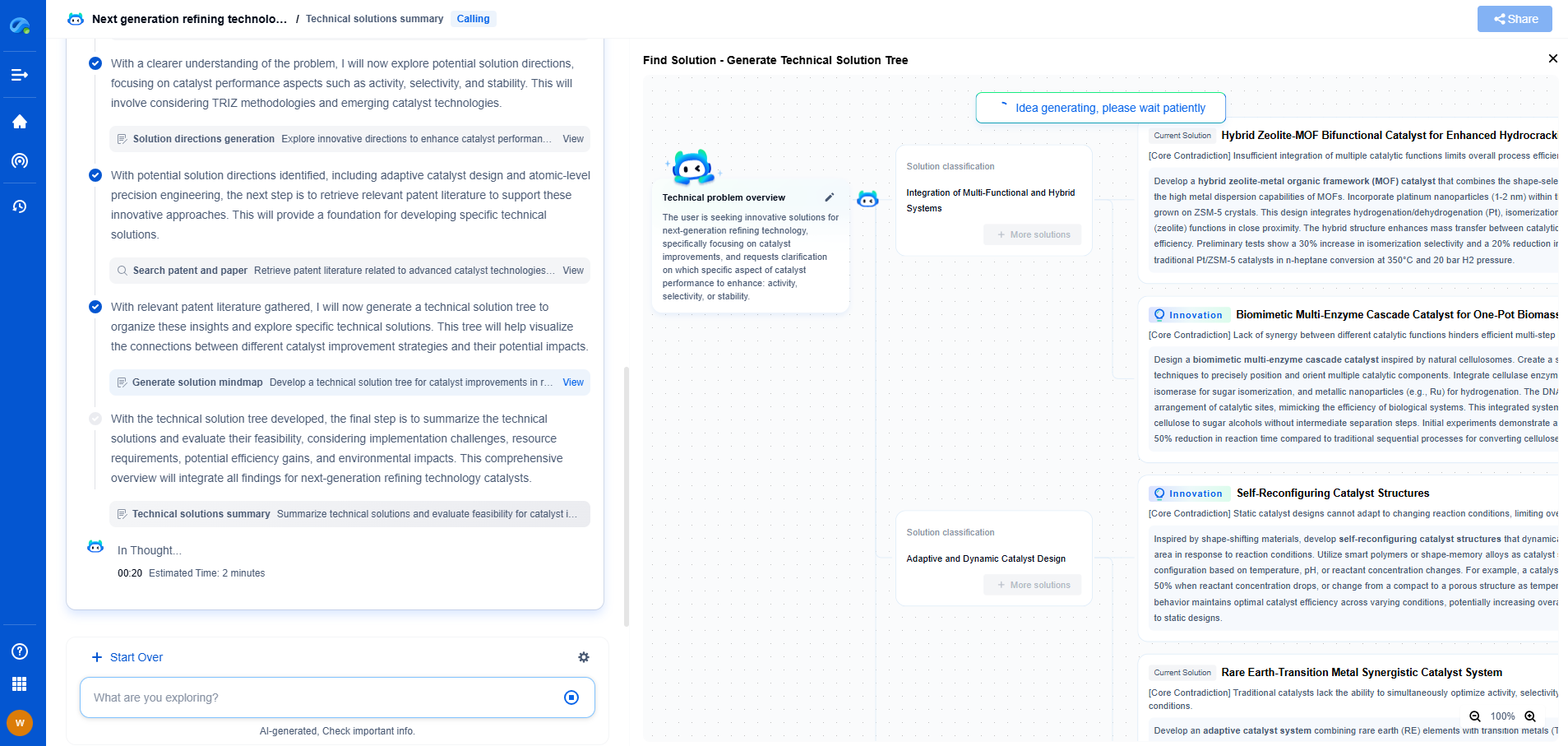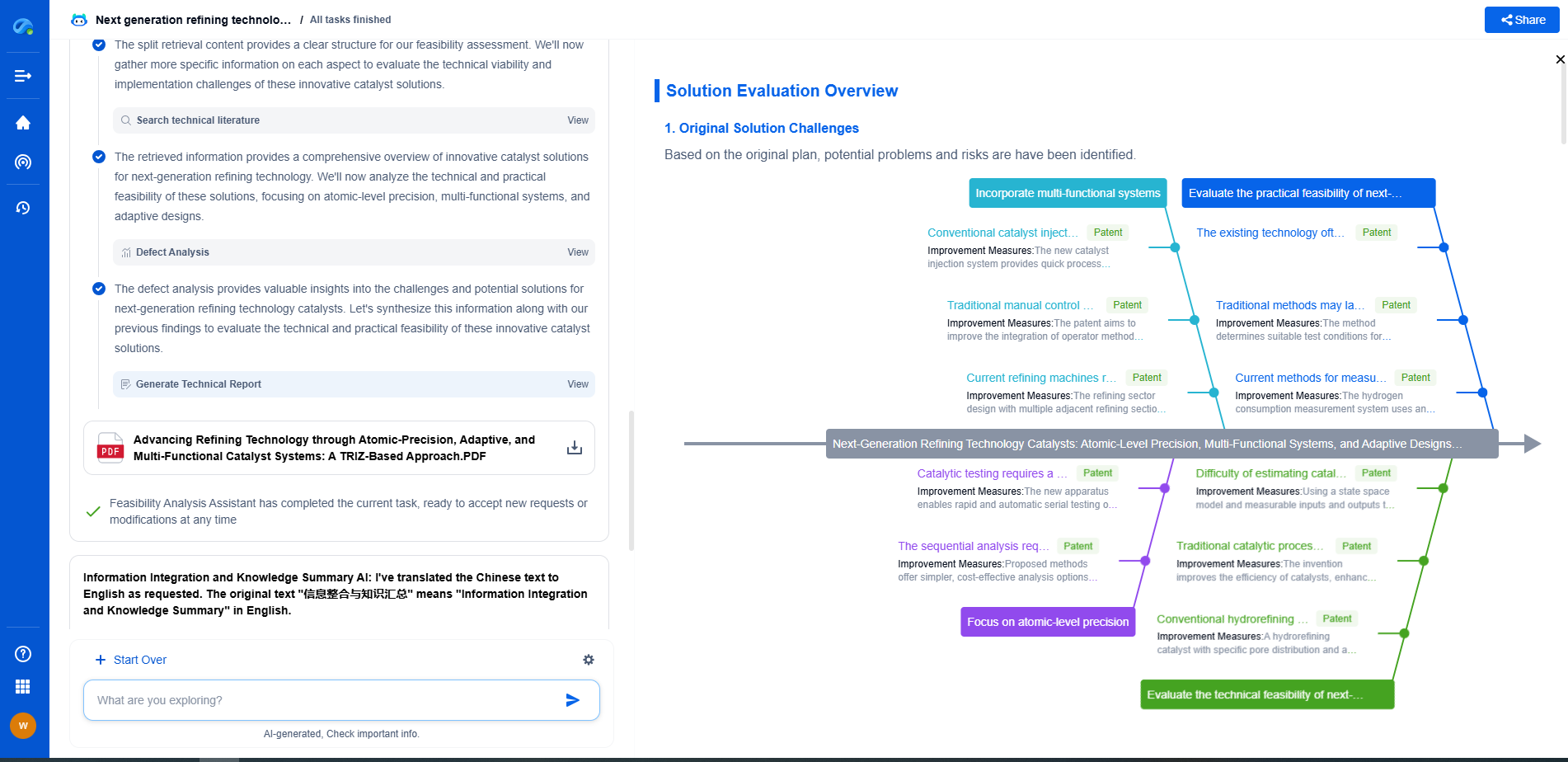Fuel Cells vs Diesel Generators: Backup Power Compared
JUN 20, 2025 |
In an era where power reliability is increasingly paramount, businesses and homeowners alike are seeking robust backup power solutions. Two prominent contenders in this realm are fuel cells and diesel generators. Each has its own set of advantages and disadvantages, catering to different needs and preferences. This article delves into a comparative analysis of these two options, exploring their efficiencies, environmental impacts, costs, and practical applications.
Understanding Fuel Cells
Fuel cells are devices that convert chemical energy directly into electrical energy through a chemical reaction involving hydrogen and oxygen. This technology is celebrated for its efficiency and eco-friendliness since the primary byproduct is water. Fuel cells operate quietly, with minimal moving parts, which translates to reduced maintenance needs and longer lifespans compared to traditional generators.
Advantages of Fuel Cells
One of the primary advantages of fuel cells is their environmental impact. As they emit only water vapor, they are an attractive option for reducing carbon footprints. Additionally, fuel cells offer a higher efficiency rate, often converting over 50% of the fuel's energy into electricity, compared to about 30-35% for diesel generators. They are also scalable, meaning they can be combined to meet varying power needs, and their modular nature allows for easy upgrades or replacements.
Disadvantages of Fuel Cells
However, fuel cells come with their own challenges. The initial investment is typically higher than that of diesel generators, which can be a deterrent for some users. The infrastructure for hydrogen production and distribution is also less developed compared to traditional fuels, which may limit accessibility and increase costs. Furthermore, while the technology is advancing, it is still less widely adopted, potentially leading to fewer support resources and expertise.
Exploring Diesel Generators
Diesel generators have been a staple in backup power for decades. They operate by burning diesel fuel to power an internal combustion engine, which generates electricity. Known for their robustness and reliability, diesel generators are a tried-and-true solution in many sectors.
Advantages of Diesel Generators
One of the most significant advantages of diesel generators is their widespread availability and established infrastructure. Diesel fuel is readily available, and the generators themselves are relatively easy to maintain with a well-established network of technicians. They are also capable of providing large amounts of power quickly, making them ideal for emergency situations where a rapid response is critical.
Disadvantages of Diesel Generators
Nevertheless, diesel generators have notable downsides, particularly concerning environmental impact. They emit carbon dioxide and other pollutants, contributing to air pollution and climate change. Additionally, diesel generators generally have higher operational costs over time due to fuel prices and more frequent maintenance needs. Noise is another factor; they tend to be loud, which can be disruptive in residential areas or quiet environments.
Cost Comparison
When comparing costs, it's essential to consider both initial investment and long-term operational expenses. Fuel cells generally require a higher upfront cost, but their lower maintenance and operating costs can be advantageous over time. Diesel generators, while less expensive initially, may incur higher costs through fuel consumption and maintenance.
Applications and Suitability
The choice between fuel cells and diesel generators often depends on the specific application and priorities of the user. For environmentally conscious users or those in urban areas with strict emissions regulations, fuel cells may be the preferred option. They are also suitable for applications where noise pollution is a concern, such as hospitals or residential areas. On the other hand, diesel generators are ideal for remote locations with limited access to hydrogen infrastructure or where immediate, high-power output is required.
Conclusion
Ultimately, both fuel cells and diesel generators offer viable solutions for backup power, each with distinct pros and cons. The decision should be guided by specific needs, budget constraints, and environmental considerations. As technology evolves, innovations in both areas may soon offer even more efficient and sustainable options, paving the way for a more resilient and eco-friendly energy future.
Accelerate Breakthroughs in Fuel Cell and Battery Innovation—with the Power of AI
From solid-state battery breakthroughs to high-efficiency hydrogen fuel cells, keeping pace with fast-evolving chemistries, global patent landscapes, and emerging application pathways is an ever-growing challenge for R&D and IP professionals.
Patsnap Eureka, our intelligent AI assistant built for R&D professionals in high-tech sectors, empowers you with real-time expert-level analysis, technology roadmap exploration, and strategic mapping of core patents—all within a seamless, user-friendly interface.
Whether you're optimizing cathode formulations, evaluating electrolyte stability, or navigating the crowded patent space around battery pack design, Eureka empowers you to move faster and with greater confidence.
Start your journey with Patsnap Eureka today—streamline your research, enhance decision-making, and power the future of energy with AI-driven clarity.
- R&D
- Intellectual Property
- Life Sciences
- Materials
- Tech Scout
- Unparalleled Data Quality
- Higher Quality Content
- 60% Fewer Hallucinations
Browse by: Latest US Patents, China's latest patents, Technical Efficacy Thesaurus, Application Domain, Technology Topic, Popular Technical Reports.
© 2025 PatSnap. All rights reserved.Legal|Privacy policy|Modern Slavery Act Transparency Statement|Sitemap|About US| Contact US: help@patsnap.com

